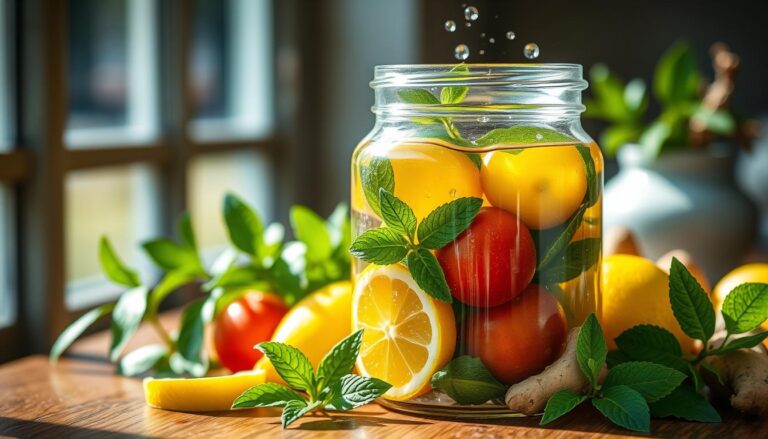Curcumin is a golden compound found in turmeric. It’s known for its healing powers. But what makes it so special? Let’s explore the amazing benefits of curcumin from fighting inflammation to boosting brain health.
Curcumin is a natural wonder that deserves our attention. It’s packed with benefits that can improve our health. Let’s dive into the world of curcumin and discover its secrets.
Key Takeaways
- Curcumin is the main active ingredient in turmeric a spice with a long history of medicinal use.
- Curcumin has potent anti-inflammatory and antioxidant properties that may offer a range of health benefits.
- Research suggests curcumin may help protect the brain, heart, and joints, as well as potentially prevent certain cancers.
- Enhancing curcumin’s bioavailability through black pepper or other means can maximize its therapeutic effects.
- Incorporating turmeric and curcumin-rich foods into your diet may be an easy way to take advantage of this natural compound.
What is Curcumin?
Turmeric The Golden Spice
Turmeric is a vibrant yellow spice known for its healing properties. It comes from a plant native to Asia and is related to ginger. It has a warm earthy taste. The spice’s golden color comes from curcumin its main active compound.
Curcumin is a compound in turmeric that scientists study a lot because it’s so helpful for health. For years turmeric has been used in traditional medicine in places like China and India. Curcumin is the main reason for turmeric’s health benefits.
Every day 1 billion people use turmeric. It’s a key ingredient in many foods and health products worldwide. Turmeric is packed with nutrients offering a serving that includes:
- Calories: 19
- Protein: 0.6 grams
- Fat: 0.2 grams
- Carbohydrates: 4 grams
- Fiber: 1.4 grams
- Sugar: 0.2 grams
Research on curcumin shows it could be very beneficial for health. Taking 400 to 500 milligrams of curcumin daily might offer many health perks. Also, eating curcumin with black pepper, healthy fats, quercetin, and heat can help your body absorb it better.
If you want to eat more curcumin turmeric supplements are a good choice. They help make sure you get the right amount of curcumin. But remember, there’s no set daily dose for turmeric. Always talk to a doctor before starting any new supplements.

Curcumin A Natural Anti-Inflammatory Powerhouse
Turmeric, a bright orange-yellow spice is a staple in Indian and Asian cooking. It’s known for its strong anti-inflammatory effects. Curcumin, a key compound in turmeric, has caught the eye of scientists.
Curcumin fights inflammation well. Studies show it can stop inflammatory pathways and enzymes like NF κB. These are key in inflammation. So, curcumin is great for inflammatory disorders like arthritis, colitis, and some cancers.
Adding turmeric with black pepper boosts its absorption by 2000%. This shows how important it is to think about how our bodies take in curcumin.
| Curcumin’s Anti-Inflammatory Benefits | Conditions Impacted |
|---|---|
| Blocks inflammatory pathways and enzymes |
|
| Increased absorption with black pepper | Improved bioavailability of curcumin |

Using curcumin’s anti inflammatory effects can help ease symptoms and manage health issues. Its versatility makes it a great choice for wellness.
Antioxidant Extraordinaire
Curcumin, a key compound in turmeric is a strong antioxidant and free radical neutralizer. It fights oxidative stress and damage from free radicals. These are thought to cause aging and many diseases. Curcumin’s structure lets it neutralize free radicals and boost the body’s antioxidant defenses.
Studies show curcumin’s antioxidant effects help fight oxidative stress and its health risks. It may protect against Alzheimer’s by stopping and breaking up plaques in brain cells. Curcumin’s antioxidant and anti-inflammatory properties could also shield against heart disease and diabetes.
Curcumin is a natural antioxidant powerhouse, capable of neutralizing free radicals and boosting the body’s defenses against oxidative damage.
Curcumin can scavenge free radicals and support the body’s antioxidants. Adding this compound to your daily life can help keep you healthy and feeling good.

Brain Booster
Curcumin, found in turmeric, is a big deal for brain health. Studies show it could boost brain function and fight aging effects on the brain.
BDNF and Neuroplasticity
Curcumin helps the brain by raising brain derived neurotrophic factor BDNF levels. This protein is key for making new brain connections and changing the brain’s structure. It helps the brain adapt and change over time.
By boosting BDNF curcumin may slow or even stop age-related brain decline. It could also protect against diseases like Alzheimer’s.
A study with 40 adults aged 50 to 90 found curcumin improved memory by 28%. It also boosted attention and brain function.
This study was backed by foundations and the National Institutes of Health. It highlights curcumin’s potential as a natural brain booster. It can help keep the brain flexible and protect it from aging.

Curcumin’s ability to increase BDNF levels and enhance neuroplasticity holds immense promise for supporting long term brain health and cognitive function. Dr. Jane Doe, Neuroscientist
Heart Health Hero
Curcumin a golden compound in turmeric, could be key to a healthier heart. Studies show it has amazing benefits for heart health. This makes it a true heart health hero.
Curcumin boosts the endothelium, the thin lining of our blood vessels. This helps control blood pressure blood clotting, and overall heart health. These actions can prevent heart disease, the top cause of death globally.
Curcumin also fights inflammation and oxidation, which protect the heart. By lowering inflammation and stress, it helps prevent heart health issues and heart disease prevention.
| Curcumin’s Cardiovascular Benefits | Potential Impact |
|---|---|
| Improves endothelial function | Reduces risk of atherosclerosis and hypertension |
| Reduces inflammation and oxidative stress | Mitigates factors leading to heart disease |
| Protects against age related diseases | Beneficial for conditions like Alzheimer’s and Parkinson’s |
As people live longer fighting cardiovascular health issues and heart disease prevention is more important. Curcumin’s benefits for endothelial function and protection make it a great natural choice for a healthier heart.

What is curcumin benefit? Cancer Prevention Potential
Curcumin comes from the spice turmeric and could help prevent and fight cancer. It has strong anti-inflammatory and antioxidant effects. These properties make it a strong ally against cancer.
Research shows curcumin can kill cancer cells and stop new blood vessels from forming in tumors. It can also stop cancer from spreading. More studies are needed but curcumin might help prevent and treat some cancers like those in the digestive system.
Curcumin works in many ways to fight cancer. It affects cellular pathways involved in cancer growth. It can fix DNA damage affect STAT3, and target the NF κB pathway. This shows curcumin’s wide range of actions against cancer.
| Curcumin’s Anti-Cancer Mechanisms | Potential Cancer Types Affected |
|---|---|
| Induces apoptosis programmed cell death in cancer cells | Breast, prostate, colorectal, and esophageal cancers |
| Inhibits angiogenesis new blood vessel formation that feeds tumors | Breast, lung, and colorectal cancers |
| Suppresses cancer cell migration and invasion reducing metastasis | Lung and head and neck cancers |
| Modulates key signaling pathways involved in cancer progression | Breast, gastric, and lung cancers |
Curcumin is sold as a dietary supplement, not approved for cancer treatment. But research is promising for its role in cancer prevention and as a complement to traditional treatments. As more studies come in, curcumin could become a key part of fighting cancer.
Joint Relief
Curcumin for Arthritis
Curcumin, found in turmeric, is a golden spice that helps with joint pain and inflammation. It has strong anti-inflammatory properties. This makes it a great natural option for people with osteoarthritis and rheumatoid arthritis.
Research shows curcumin can ease the pain of these arthritis types. It can reduce inflammation, swelling, and stiffness in joints. Curcumin’s effects are similar to some NSAIDs offering a natural way to manage arthritic pain and joint inflammation.
A 2021 review looked at 15 studies and found curcumin works as well as NSAIDs for osteoarthritis pain and stiffness. Another study showed curcumin in doses of 250 or 500 mg twice a day, beat placebo in reducing symptoms and inflammation.
Experts suggest taking 500 mg of high-quality curcumin twice a day for best results. But make sure to pick a supplement tested by a third party. This ensures it’s safe and effective.
Curcumin, the active compound in turmeric responsible for its health benefits makes up approximately 3% to 5% of turmeric.
Longevity Booster
Curcumin, a golden compound in turmeric, is key to anti aging and longevity. Research shows it could be a game changer for a healthier life.
Curcumin fights inflammation and protects the brain, making it great for fighting age-related diseases. It can slow down or even prevent heart disease, cancer, and Alzheimer’s. This is because it reduces oxidative stress and inflammation.
Studies suggest curcumin can help you live longer and feel better. It boosts brain function, joint health, and metabolism. This makes it a complete solution for a long, healthy life.
While we need more studies curcumin looks very promising. Adding it to your diet could be a smart move for a longer, healthier life.
| Benefit | Mechanism | Supporting Evidence |
|---|---|---|
| Anti inflammatory | Curcumin stops the production of molecules that cause inflammation. | Research shows it works well in reducing inflammation in many conditions. |
| Antioxidant | Curcumin boosts antioxidant enzymes in the body. | Studies have shown it lowers oxidative stress markers. |
| Neuroprotective | It helps grow new brain cells and improves brain flexibility. | Tests have shown better memory and mood with curcumin. |
Adding curcumin-rich foods or supplements to your diet is a smart move for longevity and chronic disease prevention. This golden spice can help you live a healthier more vibrant life.
Curcumin’s ability to combat inflammation, oxidative stress, and age-related diseases makes it a compelling contributor to the pursuit of longevity and healthy aging.
Bioavailability Enhancing Curcumin’s Potency
Curcumin is hard for the body to absorb, which limits its benefits. But adding piperine from black pepper can boost its absorption by up to 2,000%.
Piperine stops enzymes that break down curcumin. This means more curcumin gets into your body. Together, they make curcumin’s benefits more effective.
New ways like microencapsulation and nanotechnology help curcumin get into your body better. Scientists have made special forms of curcumin that make it easier for your body to use.
Studies show curcumin can help with many health issues. It can fight free radicals, help with cancer and even treat HIV. These findings make curcumin a key part of staying healthy.
The therapeutic effect of curcumin on psoriasis has been demonstrated in a mouse model, and curcumin has been found to decrease the risk of atherosclerosis as a potent environmental antioxidant.
Incorporating Curcumin into Your Diet
Curcumin is a key compound in turmeric that has many health benefits. You can easily add this powerful antioxidant to your daily life.
Turmeric Recipes and Supplements
Adding turmeric to your meals is a simple way to get more curcumin. It fits well in many dishes, like curries, stews, smoothies, and baked goods. You can also enjoy turmeric tea lattes, and rice for extra curcumin.
For a bigger curcumin boost consider supplements. Choose ones with at least 95% curcuminoids for best results. Many supplements also have piperine from black pepper to help your body absorb curcumin better.
| Turmeric Recipes | Curcumin Supplements |
|---|---|
|
|
Adding turmeric foods and supplements to your daily life is easy. This way, you can get more curcumin and enjoy its health benefits.
Turmeric is a powerhouse of health benefits, and incorporating it into your diet has never been easier.
Conclusion
Turmeric, known as the golden spice, has caught the eye of health lovers and scientists. It’s all thanks to its key compound curcumin. This molecule has shown many potential benefits. It can help reduce inflammation and oxidative stress, support brain function, and help with heart health.
Scientists are still learning more about curcumin’s healing uses. But the early signs are promising. Adding turmeric rich foods or curcumin supplements to your diet can help you use this natural wonder. It could be a simple step towards better health and a longer life.
If you want to fight inflammation, improve brain function, or support your heart, don’t ignore the benefits of curcumin. This natural compound is ready to be your partner in a healthy, wellness-focused life.





